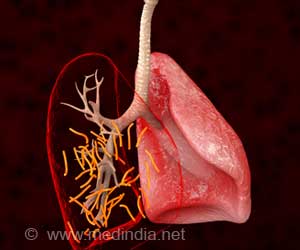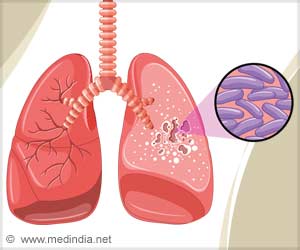Telomeres, the body's own cellular clocks, may be a crucial factor underlying the development of emphysema, according to research from Johns Hopkins University.

The study appears online ahead of the print edition of the American Journal of Respiratory and Critical Care Medicine.
Telomeres are DNA protein structures that protect chromosome ends from degradation. Their length is genetically determined, but they also shorten progressively with cell division. Short telomeres are considered one marker of ageing in cells.
"With age, short telomeres accumulate and cause cells to stop dividing. Telomeres can be thought of as ‘biological clocks," Dr. Armanios explained. "We wanted to determine whether telomere length itself was why susceptibility to emphysema increases with age."
Dr. Armanios and her colleagues examined the role of telomeres in lung disease by studying mice that have shortened telomeres. The mice were exposed to cigarette smoke for six hours a day, five days a week for six months.
The researchers then analyzed the lung tissue and pulmonary function of the mice. "Although the mice had no lung disease at baseline, after exposure to cigarette smoke, they surprisingly developed emphysema. In contrast, mice with long telomeres did not develop lung disease during our experiments," said Dr. Armanios.
Advertisement
Emphysema is a common cause of disability, and among the top 10 causes of mortality in the United States, it remains on the increase. While smoking cigarettes is the most common risk factor, it is not known why some people are more prone to developing emphysema than others. There are currently no available medical treatments, and affected individuals often require lung transplantation.
Advertisement
Dr. Armanios hopes that this new research will lead into new insights into identifying new ways to preserve lung function with age.
"It's important to remember that there is no good reason to smoke and the best way to prevent emphysema is to stop smoking," she said.
Previously, Dr. Armanios and her group had shown that shortened telomeres cause a disease known as idiopathic pulmonary fibrosis (IPF), a disorder of unrelenting scarring in the lung. IPF occurs with emphysema in some individuals, and the incidence of both disorders increases with age and with smoking. "By linking telomere length to both disorders, there is now clear suggestion that they may share a common mechanism that can be traced to telomeres."
Further research must be done to confirm that the observed findings are applicable to humans, and, if so, what mechanisms might underlie them. "Now that we have examined the question of susceptibility in a rigorous genetic model, we can begin to study how telomere length affects emphysema risk in susceptible populations."
Source-Newswise












